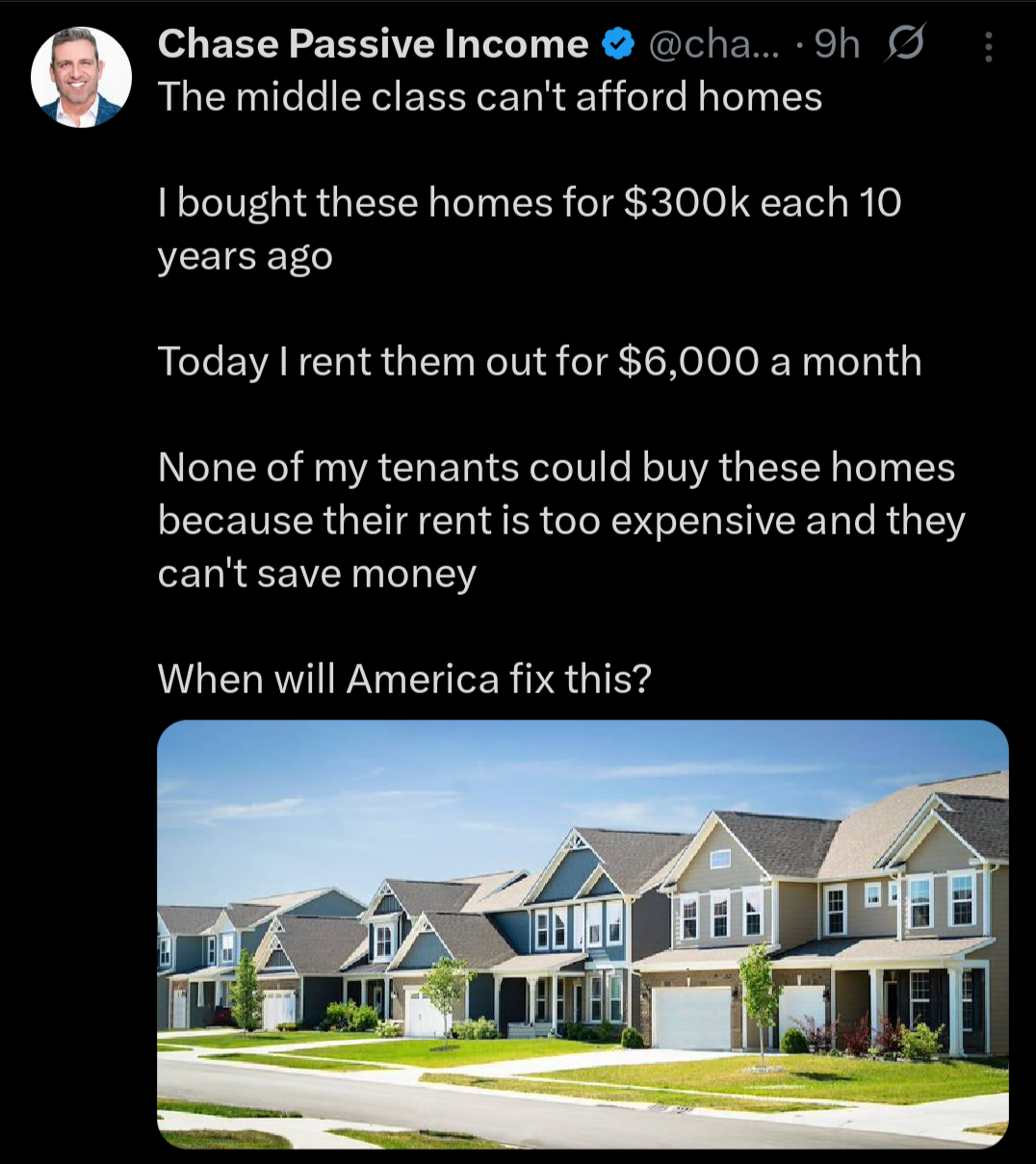this post was submitted on 18 Aug 2025
955 points (99.4% liked)
People Twitter
8379 readers
1568 users here now
People tweeting stuff. We allow tweets from anyone.
RULES:
- Mark NSFW content.
- No doxxing people.
- Must be a pic of the tweet or similar. No direct links to the tweet.
- No bullying or international politcs
- Be excellent to each other.
- Provide an archived link to the tweet (or similar) being shown if it's a major figure or a politician. Archive.is the best way.
founded 2 years ago
MODERATORS
you are viewing a single comment's thread
view the rest of the comments
view the rest of the comments

When the underlying problem is insufficient supply in the locations people want to live, anything that gives average person more purchasing power (such as making banks comfortable with larger loans) just drives up the price even higher.
Densifying metro areas (the places people are moving to) is the only real solution. Otherwise the price has to be unaffordable for the average person, to drive them into finding a way to live in a more rural area or to put up with a multiple-roommate living arrangement.
While I agree with this principle generally, and I believe that if my solution were to be implemented it would need to be alongside other schemes like increased public housing projects, relaxing zoning laws to allow densification, and anti-scalping measures like a quadratic property tax.
But even if my suggestion were implemented alone, it wouldn't result in increased prices. That's got to do with the fact that ordinary people, right now in the US, largely do not bid in foreclosure auctions. All that housing supply is actually not going to end consumers at all. The type of people who would bid at foreclosure auctions are not those who want to live in the house but in many cases, those who want to resell it. Making the foreclosure process more similar to normal house-buying and thereby increasing the hammer prices drives out scalpers and flippers because it's not profitable for them any more. Hell, if you've seen the videos these people post, they start pulling back even if the price is tens of thousands of dollars under market.
That was the part I meant about this proposal increasing demand by giving the average person more purchasing power.
Multiple strategies makes sense. Quadratic property tax is a new one to me, and it confused Google. Is it like a progressive tax, where larger valuations are taxed at a higher rate?
It gives the average person more purchasing power but it also opens up new supply by opening the foreclosure auctions to the average person. The increased demand I argue is partially or wholly counteracted by pushing out the house flippers from the foreclosure markets; those people are generally only interested in buying properties at severely under market prices at foreclosure auctions or similar sales. Essentially, I am saying that the entire "flipper" business model should be destroyed as it does not provide sufficient value to the taxpayer to offset its negative effect on the market and this policy could do severe damage to that sector.
Quadratic property tax is a combination of the "quadratic" nature of quadratic voting and, of course, taxation. I made this term up hoping people would know what I was talking about but it turned out to not be as obvious as I initially thought.
Essentially, the taxation scheme takes into account the number of lots owned by a person in addition to the value per lot. Consider the following sample scheme:
The amount of tax due on any given property is calculated according to the following formula: r×(1 + Np)²×V, where N is the number of lots owned by the taxpayer beyond the first and V is the value of the lot. The variables r and p are determined by the local taxing authority which correspond to tax rate (higher = more tax per unit of money) and the penalty for owning excessive numbers of lots (higher = greater penalty for owning multiple lots).
If a local taxing authority selects values r = 0.002 and p = 0.05, the tax due for a lot worth 100 units of money would be as follows:
It is "quadratic" because the tax rate scales with the square of the number of previous lots owned.
Coupled with counting rules that ignore subsidiary corporate entities for the purpose of determining ownership, finely-tuning values of r and p will discourage corporate ownership of housing without punishing individual homeowners or small-time landlords.
While this strategy has not been tried in real life to my knowledge, interestingly, some Minecraft servers have implemented a similar scheme to prevent hoarding of desirable lots in the overworld to varying degrees of success, mostly depending on whether those in charge admit any loopholes for privileged players to exploit.
Ah, I missed part where home flippers left the market. I'm not totally following the chain of logic after that, but I am OK with that.
I am not convinced using regulation (tax incentive or otherwise) to drive larger landlords out of the market would improve the experience of the average renter. Some small landlords are terrible. With proper regulation, some ginormous ones are good (countries that do public housing well - government-run is bigger than any corporate landlord).